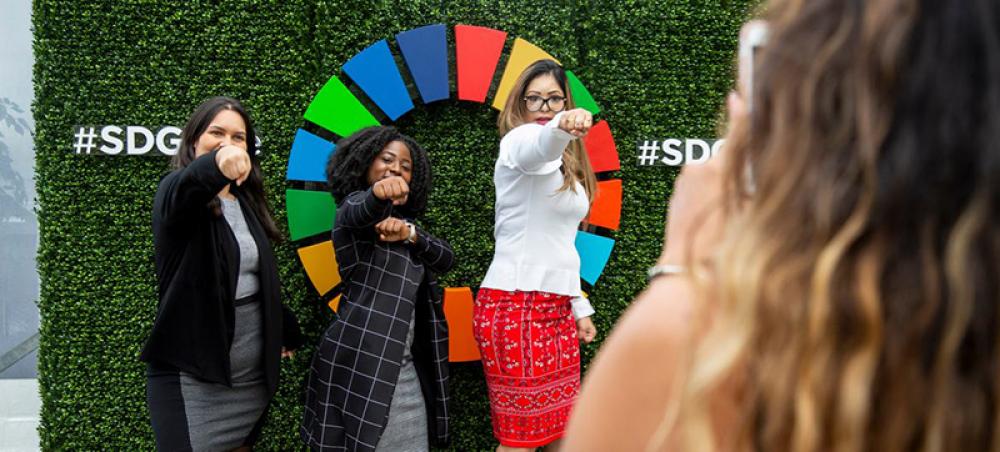Just Earth News | @justearthnews | 20 Apr 2022

Image: UN Photo/Laura Jarriel
New York: Youth activism has been “pushing the world forward,” UN High Commissioner for Human Rights Michelle Bachelet told Day 1 of the Economic and Social Council (ECOSOC)’s annual Youth Forum on Tuesday.
“From the streets of every corner of the world to the online arena, we have seen powerful demonstrations of youth commitment to equality, climate action and human rights,” she said, adding that they are demanding a seat at the table and holding Governments and businesses to account for their inaction.
UN experts joined youth leaders, activists and Government officials from around the globe in kicking off a virtual two-day meeting under the theme COVID-19 recovery: Youth taking action for a sustainable future.
COVID-19 factor
Given the disproportionate impact of their suffering during the COVID-19 pandemic, the meeting highlighted that young people must be at the forefront of planning for a post-COVID-19 future.
From remote workplaces to green energy to truly inclusive decision-making, their vision and courage are more vital than ever.
The High Commissioner informed the participants that one in eight students globally has been left without any access to education or training, most in low-income countries.
Meanwhile, she continued, school closures have rendered girls and young women more vulnerable to child marriage, early pregnancy and gender-based violence.
‘Invaluable’ work
However, the Ms. Bachelet also stressed that youth have “tremendous potential” to help the world recover.
She thanked young people from around the world for “standing up for our planet and for human rights,” describing their work, commitment and energy as “invaluable”.
“I stand with you,” concluded the High commissioner.
Call for fresh innovation
Deputy Secretaryâ€General Amina Mohammed urged world leaders to address the needs of young people as they design plans for “getting back to a better place.”
As the world is changing rapidly, she called for fresh innovation in areas from decision-making to work life, pointing out that young people – many of whom are already “digital nomads” rethinking a traditional five-day workweek – must be part of shaping the world’s future trajectory.
While youth cannot be expected to become Prime Ministers and Presidents overnight, the average age of leaders must drop, and more attention must be paid to how many young people are part of the system.
She noted many calls for inclusion and warned adult leaders against sounding like a “broken record.”
“We need to get to the implementation,” she stressed.
Seat at the table
ECOSOC President Collen V. Kelapile noted that as the world continues to grapple with the pandemic and other global challenges, a sustainable future can only be built through youth empowerment and with their meaningful engagement.
“I strongly believe that the Sustainable Development Goals (SDGs) offer a roadmap to build sustainable, inclusive and thriving societies and reinvigorate global solidarity for the 21st Century,” he said.
Now, more than ever, he underscored that “youth legitimately deserve to have a seat at the table”, when decisions about their future are being made.
Structural barriers
Meanwhile, UN Youth Envoy Jayathma Wickramanayake stressed that a lack of youth in decision-making is “an ongoing problem.”
Although young people will inherit all the repercussions of decisions made today, only about three per cent of the world’s Parliamentarians are currently under the age of 30.
Moreover, many structural, legal and financial barriers – as well as lingering stereotypes – seriously hinder youth participation.
And some 2.2 billion children around the world still lack an Internet connection and many remain sidelined from basic health and education, which also hampers their meaningful engagement.
‘Ticking the box’
Meanwhile, Filipina Climate Justice Advocate Marinel Ubaldo warned against “tokenism” and exploiting marginalized youth voices to simply “tick the box” of inclusion.
While young leaders often galvanize attention, she said, they largely remain outside decision-making circles.
“I feel like I am used” as a young woman and a super-typhoon survivor who is expected to tell her sad story, but not to share her activism and action, she said, calling for youth momentum to be urgently translated into more meaningful engagement.